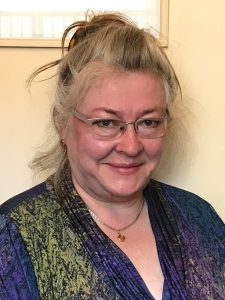April 2022
The Bridge: Why did you decide to become an osteopath?
Liza Adams: I’ve always been interested in health and I realised quite young that I wanted to soothe people, to help them avoid pain and have a healthy life. I was brought up by my grandma and I was also a young carer, which might have something to do with it. I spent four years training at the British School of Osteopathy [now the University College of Osteopathy] in London, and achieved a master’s degree. My thesis was about experimental methods in psychology that help us to understand how the brain deals with pain.
TB: What’s your favourite part of the job?
LA: I love meeting people and I’m nosy, so I’m never bored! It’s a sociable job and I enjoy helping people through their troubles. I also love receiving positive feedback from patients, particularly when I’ve fixed a longstanding problem in a simple way. I’ve been practising for 32 years and getting good results has always been my motivation.
TB: What are the most common conditions that you treat?
LA: We see a huge mix of patients, all ages and genders with all sorts of problems. I do see a lot of shoulder and neck issues, though, usually caused by people sitting at their computer or another screen, and of course this problem has grown during Covid as working arrangements have changed and many people have been less active.
There’s a spectrum between perfect health and extreme illness, and my approach to treatment is to help people move along this path in the right direction. It’s a hands-on process, but I take a moderate approach rather than extreme measures; it can be hard to predict how someone will respond to treatment, so often I try something then see how the patient gets on. I don’t want people to have to keep coming to me for ever, though, and I aim to find a permanent solution to their pain – find it, fix it, leave it! Osteopathy is about the relationship between the body’s structure and its function, and we treat the patient rather than the condition, although with everyone I look out for any signs of a serious condition that might be causing their pain. If this happens I have no hesitation in referring them to a different medical specialist or urging them to see their GP. This isn’t passing the buck, just being careful for the patient.
TB: Tell us about some of the highlights of your career.
LA: I think one of the most fascinating periods in my working life was with an American football team in London. I did this while I was an undergraduate, then for a few more years afterwards, and it was an amazing experience. If there was an injury I had to be first on the scene so I used to run on to the pitch. There were some interesting injuries, although they tended to be to the head or the neck, and those are the injuries I worry about most – particularly now that my one of my sons plays American football!
I also spent time working with Age Concern [now Age UK] at the old Chancery House day centre here in Bridport, and at an acute back pain clinic too. Both were really fulfilling.
TB: You’ve worked as a volunteer treating survivors of the first Gulf War for injuries sustained during torture and for post-traumatic stress disorder (PTSD). What did you learn from this?
LA: I learnt that the human spirit is amazingly resilient. Some people make it through, no matter what they have faced, and I met some who were even working on finding a path to forgiveness, often supported by a deep, undiminished faith. Torture is about the destructuring of the victim’s life; it can involve slowly exposing them to trauma with the intention of destroying their spirit as well as making them suffer physically. Even without that, the violence of military life itself, and being kept away from family and friends, can lead to PTSD.
We treated the lasting effects – for instance, something like falanga [having the soles of the feet beaten] can lead to chronic lower back pain – and went through breathing techniques and gentle body work to ease emotional trauma.
TB: What’s the most beneficial thing an individual can do to maintain good health into middle age and beyond?
LA: Beyond the basics of getting good sleep and a good diet, I’d say having good friends and finding true purpose. Find your perfect role in life – I think that’s what I’ve done!
www.lizaadams.co.uk